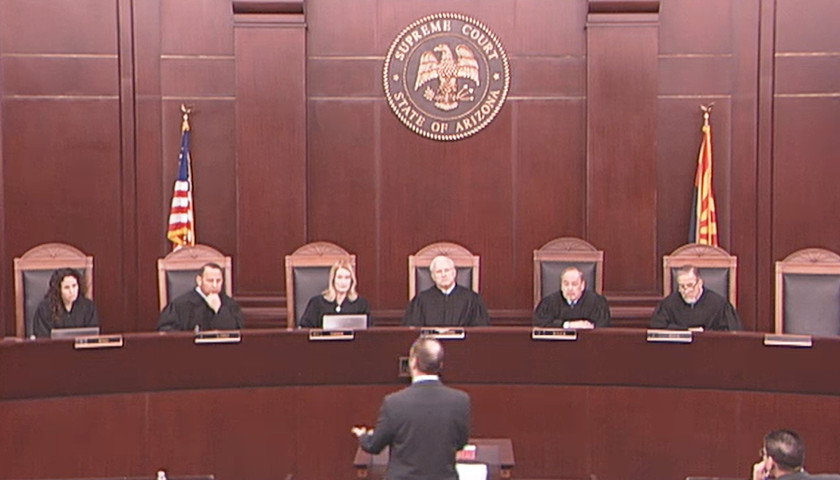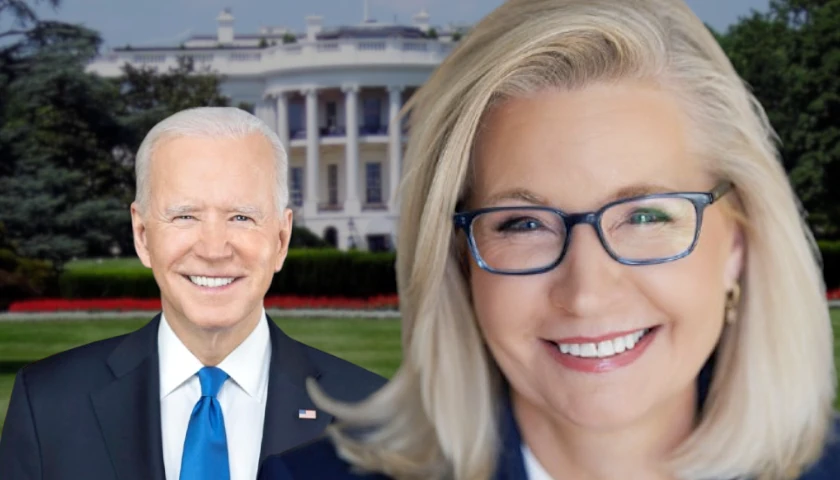The Arizona Supreme Court heard oral arguments on Tuesday in a case involving challenges to Arizona’s 1864 law that mostly banned abortion. The Arizona Legislature passed a law in 2022 banning abortions after 15 weeks, anticipating the U.S. Supreme Court reversing Roe v. Wade in Dobbs v. Jackson. The reversal also revived the older law, which was initially passed when Arizona was still a territory. In October 2022, the Arizona Court of Appeals found that the two laws were in conflict, and placed an injunction on the older law from going into effect for physicians, effectively allowing abortions to take place up to 15 weeks under the new law.
Since Attorney General Kris Mayes declined to pursue the case after the appeals court ruling, Dr. Eric Hazelrigg, an obstetrician and medical director of Choices Pregnancy Center in Arizona, filed a petition in March asking the state’s high court to review the ruling and the injunction, which it agreed to do. Former Attorney General Mark Brnovich had initially asked a court to reinstate the original pro-life law, which was blocked in 1973 due to Roe, but the trial court’s revival of the law was quickly reversed by the appeals court.
Alliance Defending Freedom (ADF) is representing intervenor Hazelrigg. ADF attorney Jake Warner told the justices on Tuesday that the Arizona Legislature did not intend with the 15-week ban to repeal the older law. That law, A.R.S. 13-3603, prohibits all abortion except to save the life of the mother and applies to anyone who assists a woman with obtaining an abortion. It is punishable by two to five years in prison.
If there is a conflict between the two laws, Warner said, “The Legislature has given express direction. The pre-Roe law, 13-3603, is the winner if we have to choose.”
Warner said the two laws can be harmonized by allowing abortion only to save the life of the mother. The 2022 law prohibits abortion after 15 weeks except for an “immediate” medical emergency that risks the patient’s life or irreversible bodily harm occurs. Violating the newer law is a class 6 felony and revokes the medical licenses of doctors who violate it.
Justice Ann Scott Timmer pointed out to Warner that some county attorneys have said they will not prosecute the older law. Warner responded, “The fact that we have uncertain enforcement doesn’t make the law unenforceable. There’s nothing unclear about the law itself.”
Democratic Governor Katie Hobbs issued an executive order earlier this year transferring the power of county attorneys to prosecute abortion law violations to the attorney general’s office, where Mayes refuses to enforce them. Hobbs filed an amicus curiae brief in the case supporting Planned Parenthood.
Warner said, “We’ve learned over the past 50 years the science has shown that the viability in mind for unborn children keeps going down and down.”
Attorneys for Mayes and Planned Parenthood of Arizona argued that the 2022 law preempts the older law. Justice Clint Bolick pointed out to Planned Parenthood’s attorney, Andy Gaona, of the Democratic firm Coppersmith Brockelman, that the new law didn’t make any abortions legal.
“It also specifically references the territorial law and says that it’s not repealed by implication or otherwise,” he said. “What does that all mean?”
Gaona argued that the 2022 law should have clarified that the 1864 law took precedence. But Warner explained that the Arizona Legislature didn’t know when it drafted the new law that SCOTUS would reverse Roe v. Wade completely.
Several pro-life groups, state legislators, Yavapai County Attorney Dennis McGrane, and 17 states filed amicus curiae briefs with the Arizona Supreme Court in support of the older law.
Arizona Supreme Court Justice Bill Montgomery recused himself from the case after left-leaning media complained about his prior pro-life statements. The remaining six justices will decide the case. Six of the justices lean to the right (except on election integrity issues), with Timmer considered the lone left-leaning justice. If there is a split decision, 3-3, the lower court’s ruling upholding only the 2022 law would remain in effect. The justices could have appointed a temporary justice to replace Montgomery but chose not to.
Pro-abortion groups are seeking to get a proposition on the 2024 ballot to bring back abortions, named the Arizona Abortion Access Act. It would create a “fundamental right” to receive an abortion up until fetal viability or about the 24th week of pregnancy. If enacted, amending Arizona’s constitution it would prevail over the Arizona Supreme Court’s decision. The court gave no indication when it would issue its ruling.
– – –
Rachel Alexander is a reporter at The Arizona Sun Times and The Star News Network. Follow Rachel on Twitter / X. Email tips to [email protected].








